各种从句的翻译
- 格式:pptx
- 大小:250.72 KB
- 文档页数:22
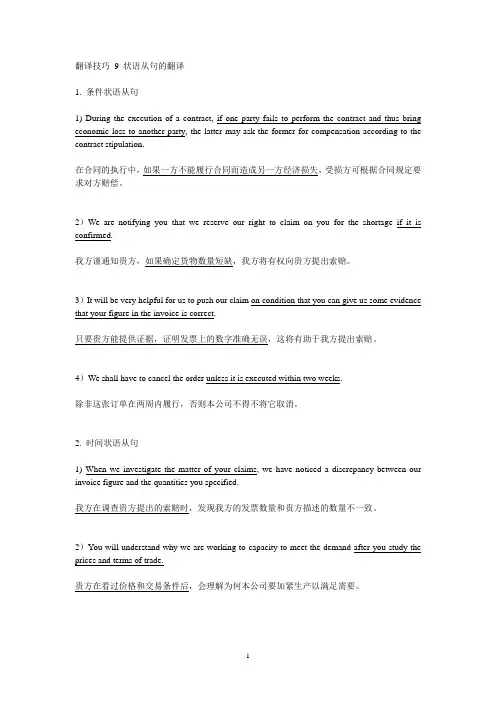
翻译技巧9 状语从句的翻译1. 条件状语从句1) During the execution of a contract, if one party fails to perform the contract and thus bring economic loss to another party, the latter may ask the former for compensation according to the contract stipulation.在合同的执行中,如果一方不能履行合同而造成另一方经济损失,受损方可根据合同规定要求对方赔偿。
2)We are notifying you that we reserve our right to claim on you for the shortage if it is confirmed.我方谨通知贵方,如果确定货物数量短缺,我方将有权向贵方提出索赔。
3)It will be very helpful for us to push our claim on condition that you can give us some evidence that your figure in the invoice is correct.只要贵方能提供证据,证明发票上的数字准确无误,这将有助于我方提出索赔。
4)We shall have to cancel the order unless it is executed within two weeks.除非这张订单在两周内履行,否则本公司不得不将它取消。
2. 时间状语从句1) When we investigate the matter of your claims, we have noticed a discrepancy between our invoice figure and the quantities you specified.我方在调查贵方提出的索赔时,发现我方的发票数量和贵方描述的数量不一致。
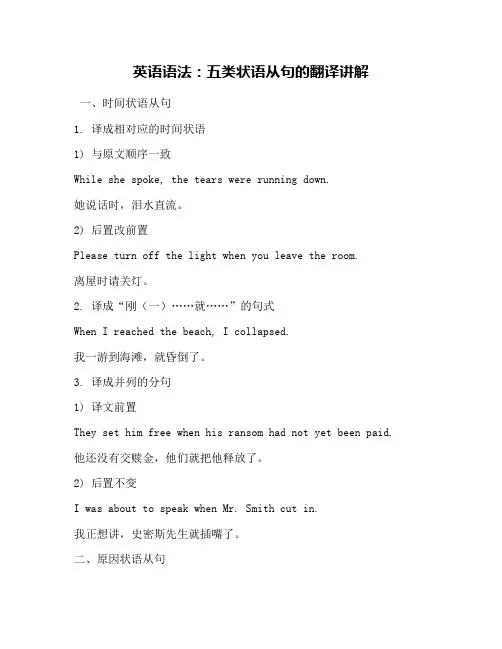
英语语法:五类状语从句的翻译讲解一、时间状语从句1. 译成相对应的时间状语1) 与原文顺序一致While she spoke, the tears were running down.她说话时,泪水直流。
2) 后置改前置Please turn off the light when you leave the room.离屋时请关灯。
2. 译成“刚(一)……就……”的句式When I reached the beach, I collapsed.我一游到海滩,就昏倒了。
3. 译成并列的分句1) 译文前置They set him free when his ransom had not yet been paid.他还没有交赎金,他们就把他释放了。
2) 后置不变I was about to speak when Mr. Smith cut in.我正想讲,史密斯先生就插嘴了。
二、原因状语从句1. 译成表“因”的分句1) “因”在“果”之前The crops failed because the season was dry.因为气候干旱,作物歉收。
2) “果”在“因”之前She could get away with anything, because she looked such a baby.她能渡过任何风险,因为她看上去简直还像娃娃模样。
2. 译成因果偏正复句中的主句Pure iron is not used in industry because it is too soft.纯铁太软,所以不用在工业上。
Because he was convinced of the accuracy of this fact, he stuck to his opinion.他深信这件事准确可靠,所以坚持己见。
3. 译成无关联词的因果关系并列分句Where there is sound, there must be sound waves.哪里有声音,哪里就必有声波。
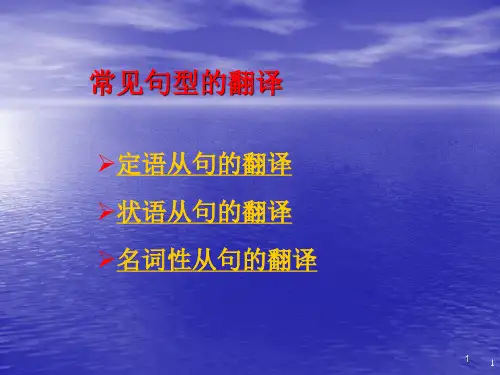
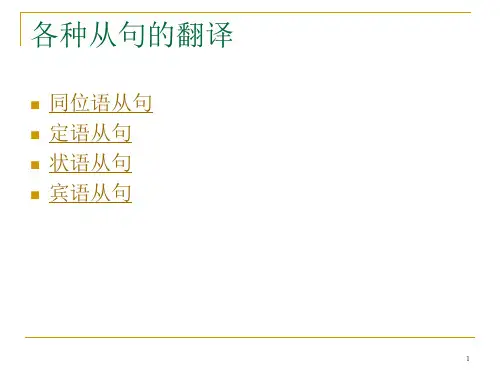
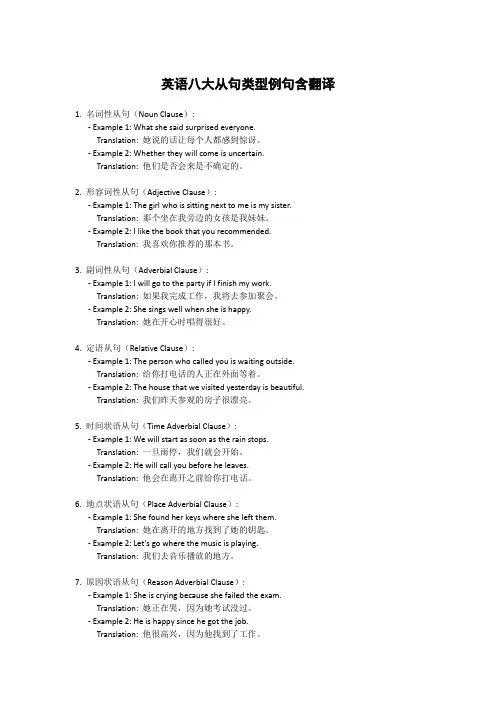
英语八大从句类型例句含翻译1. 名词性从句(Noun Clause):- Example 1: What she said surprised everyone.Translation: 她说的话让每个人都感到惊讶。
- Example 2: Whether they will come is uncertain.Translation: 他们是否会来是不确定的。
2. 形容词性从句(Adjective Clause):- Example 1: The girl who is sitting next to me is my sister.Translation: 那个坐在我旁边的女孩是我妹妹。
- Example 2: I like the book that you recommended.Translation: 我喜欢你推荐的那本书。
3. 副词性从句(Adverbial Clause):- Example 1: I will go to the party if I finish my work.Translation: 如果我完成工作,我将去参加聚会。
- Example 2: She sings well when she is happy.Translation: 她在开心时唱得很好。
4. 定语从句(Relative Clause):- Example 1: The person who called you is waiting outside.Translation: 给你打电话的人正在外面等着。
- Example 2: The house that we visited yesterday is beautiful.Translation: 我们昨天参观的房子很漂亮。
5. 时间状语从句(Time Adverbial Clause):- Example 1: We will start as soon as the rain stops.Translation: 一旦雨停,我们就会开始。
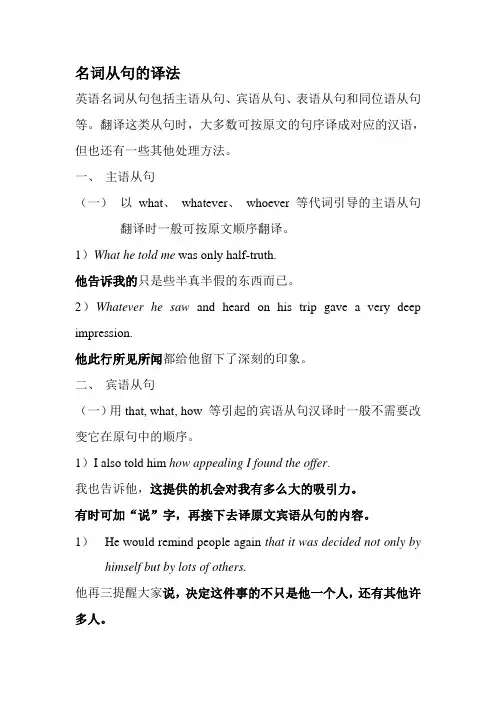
名词从句的译法英语名词从句包括主语从句、宾语从句、表语从句和同位语从句等。
翻译这类从句时,大多数可按原文的句序译成对应的汉语,但也还有一些其他处理方法。
一、主语从句(一)以what、whatever、whoever 等代词引导的主语从句翻译时一般可按原文顺序翻译。
1)What he told me was only half-truth.他告诉我的只是些半真半假的东西而已。
2)Whatever he saw and heard on his trip gave a very deep impression.他此行所见所闻都给他留下了深刻的印象。
二、宾语从句(一)用that, what, how 等引起的宾语从句汉译时一般不需要改变它在原句中的顺序。
1)I also told him how appealing I found the offer.我也告诉他,这提供的机会对我有多么大的吸引力。
有时可加“说”字,再接下去译原文宾语从句的内容。
1)He would remind people again that it was decided not only by himself but by lots of others.他再三提醒大家说,决定这件事的不只是他一个人,还有其他许多人。
三、表语从句英语表语从句和宾语从句一样,一般可按原文顺序翻译。
1)What he emphasized over and over again was that no matter how difficult it might be, they should never retreat even for an inch.他所再三强调的是,不管多么困难,他们决不应该后退寸步。
2) That was how a small nation won the victory over a big power.就这样,小国战胜了大国。
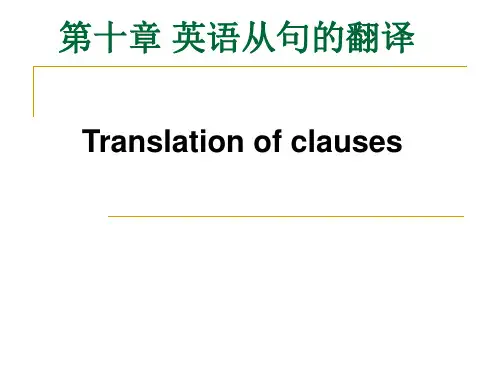
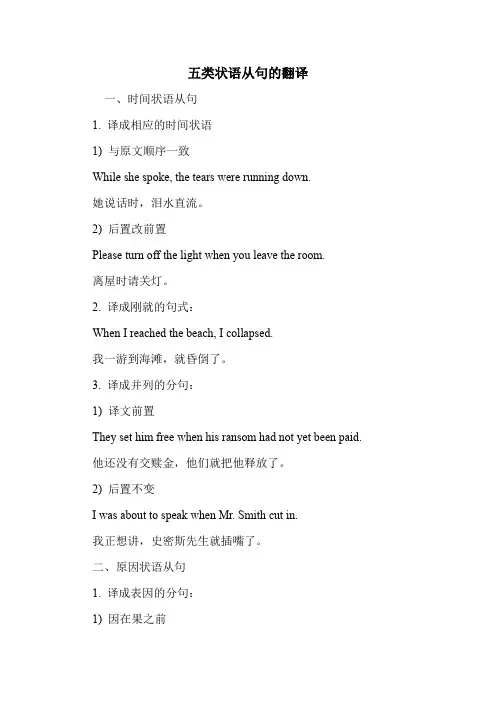
五类状语从句的翻译一、时间状语从句1. 译成相应的时间状语1) 与原文顺序一致While she spoke, the tears were running down.她说话时,泪水直流。
2) 后置改前置Please turn off the light when you leave the room.离屋时请关灯。
2. 译成刚就的句式:When I reached the beach, I collapsed.我一游到海滩,就昏倒了。
3. 译成并列的分句:1) 译文前置They set him free when his ransom had not yet been paid. 他还没有交赎金,他们就把他释放了。
2) 后置不变I was about to speak when Mr. Smith cut in.我正想讲,史密斯先生就插嘴了。
二、原因状语从句1. 译成表因的分句:1) 因在果之前The crops failed because the season was dry.因为气候干旱,作物歉收。
2) 果在因之前She could get away with anything, because she looked such a baby.她能渡过任何风险,因为她看上去简直还像娃娃模样。
2. 译成因果偏正复句中的主句:Pure iron is not used in industry because it is too soft.纯铁太软,所以不用在工业上。
Because he was convinced of the accuracy of this fact, he stuck to his opinion.他深信这件事正确可靠,因此坚持己见。
3. 译成无关联词的因果关系并列分句:Where there is sound, there must be sound waves.哪里有声音,哪里就必有声波。
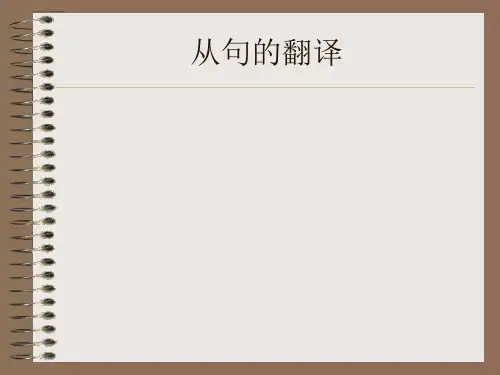
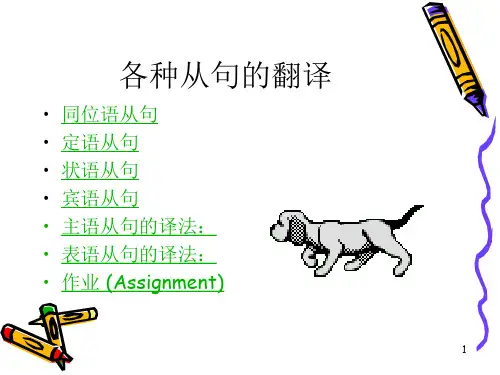
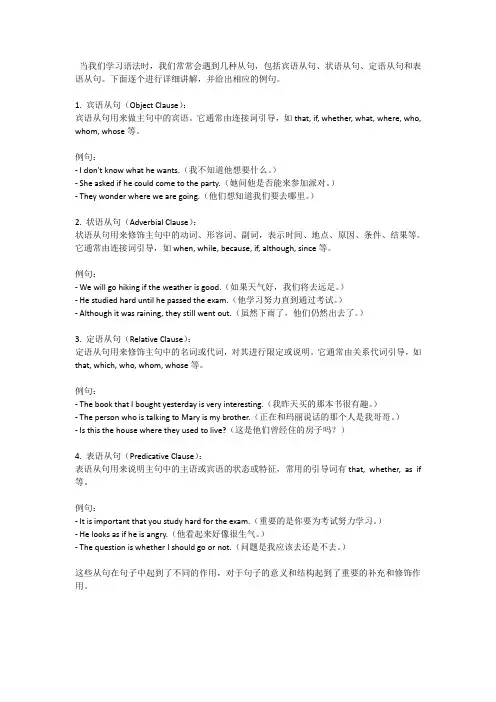
当我们学习语法时,我们常常会遇到几种从句,包括宾语从句、状语从句、定语从句和表语从句。
下面逐个进行详细讲解,并给出相应的例句。
1. 宾语从句(Object Clause):宾语从句用来做主句中的宾语。
它通常由连接词引导,如that, if, whether, what, where, who, whom, whose等。
例句:- I don't know what he wants.(我不知道他想要什么。
)- She asked if he could come to the party.(她问他是否能来参加派对。
)- They wonder where we are going.(他们想知道我们要去哪里。
)2. 状语从句(Adverbial Clause):状语从句用来修饰主句中的动词、形容词、副词,表示时间、地点、原因、条件、结果等。
它通常由连接词引导,如when, while, because, if, although, since等。
例句:- We will go hiking if the weather is good.(如果天气好,我们将去远足。
)- He studied hard until he passed the exam.(他学习努力直到通过考试。
)- Although it was raining, they still went out.(虽然下雨了,他们仍然出去了。
)3. 定语从句(Relative Clause):定语从句用来修饰主句中的名词或代词,对其进行限定或说明。
它通常由关系代词引导,如that, which, who, whom, whose等。
例句:- The book that I bought yesterday is very interesting.(我昨天买的那本书很有趣。
)- The person who is talking to Mary is my brother.(正在和玛丽说话的那个人是我哥哥。
桂林旅游高等专科学校教案第十六讲从句翻译Lecture 16 Clauses一、名词从句的译法(Noun Clause)(一)主语从句(Subject Clause)(引导词that, what, whether, who, when, where, why, how, which, whose, whatever…)(先译主句还是先译从句?whatever等引导的,先译从句;it作形式主语的,视情况而定)1.It is strange that we should meet here.我们能在这里见面,这真是想不到。
(逆译法:先译从句,后译主句)2. It is essential that every child should have the same opportunity to have education.每个儿童都应当有同样的受教育的机会,这一点是非常重要的。
(逆译法:先译从句,后译主句)3. It is a common misconception that English is extraordinarily difficult for foreigners to learn.英语对外国人来说特别难学,这是一种普遍的误解。
(逆译法:先译从句,后译主句)4. It is a matter of common experience that bodies are lighter in water than they are in air.物体在水中比在空气中轻,这是一种大家共有的经验。
(逆译法:先译从句,后译主句)5. It's really a mystery why all our attempts have been unsuccessful.为什么我们的一切尝试都失败了,这真是个谜。
(逆译法:先译从句,后译主句)6.It is a truth universally acknowledged that a single man in possession of a good fortune must be in want of a wife. (An abstract from Pride and Prejudice, by Jane Austen)a)凡是有钱的单身汉,总想娶位太太,这已经成了一条公认的真理。
英语从句的翻译定语从句按照翻译的顺序可以有以下几种:一.前置法The people who worked for him live in mortal fear of him.在他手下工作的人对他怕的要死。
二.后置法They are striving for the ideal which is close to the heart of every Chinese and for which, n the past, many Chinese have laid down their lives.他们正在为实现一个理想而努力,这个理想是每个中国人所珍爱的,在过去,窳惰中国人曾为了这个理想而牺牲了自己的生命。
三.溶合法There was another man who seemed to have answers, and that was Robert McNamara.另外一个人似乎胸有成竹,那就是麦克纳马拉。
四.独立成句He had talked to Vice-president Nixon, who assured him that everything that could be done would be done.他和副总统尼克松谈过话。
副总统向他担保,凡是能够做到的都将竭尽全力去做。
宾语从句一.用that,how,what等引起的宾语从句汉译时一般不改变顺序I told him that because of the last condition, I’d have to turn it down. 我告诉他,那是最后一个条件,我只得谢绝。
二.用it作假宾语的句子,译时that引起的宾语从句一般可按原文顺序;it不译。
I made it clear to them that they must hand in their papers before 10 o’clock in the morning.我向他们讲清楚了的,他们必须在上午十点前交卷。
名词性从句的翻译英语的名词性从句包括主语从名、宾语从句、表语从句和同位语从句等。
翻译的时候,大多数可以按照原文的句子顺序翻译成相应的汉语译文。
但是,有时候,可以采用其他翻译方法来灵活处理。
一、主语从句(一)以what, whatever, whoever, whether, when, where, how, why等词引导的主语从句,在翻译的时候,一般可以按照英语原文顺序来翻译。
What he told me was only half-truth.他告诉我的只是些半真半假的东西而已。
Whatever is worth doing should be done well.任何值得做的事情都应该做好。
Whether he comes or not makes no difference.他来不来都没有关系。
】When we can begin the expedition is still a question.我们何时才能开始这次考察仍然是悬而未决。
How he is going to do it is a mystery.他准备怎么做这个事情是个迷。
(二)用it作形式主语的主语从句,可以把主语从句放到汉语句子最前面去翻译。
为了强调起见,it一般可以译出来;如果不需要强调,it也可以不译出来。
It doesn’t make much difference whether he attends the meeting or not.他参加不参加会议没有多大关系。
(It没有翻译)It seemed inconceivable that the pilot could have survived the crash.驾驶员在飞机坠毁之后,竟然还能活着,这看来是不可想象的。
(It翻译为“这”)有时候,如果主语从句仍然按照英语原来的顺序翻译的话,it一般不需要译出来。
在汉语译文的开始,一般可以用“...的是,...”这样的结构来翻译。
英语从句翻译方法英语多从句,汉语多分句:就句子类型而言,英语句子不仅可以在简单句中使用很长的修饰语使句子变长,同时也可以用从句使句子变复杂,而这些从句往往通过从句引导词与主句或其它从句连接,整个句子尽管表面上看错综复杂却是一个整体。
汉语本来就喜欢用短句,加上表达结构相对松散,因此,英译汉时需要将各种英语从句进行处理,可以译成一个汉语单句,也可译成多个汉语分句。
并按照汉语的表达习惯对英语复合句的关联部分(从句引导词)加以逻辑梳理,既分而叙之,又上关下联,承接转换,犹如整容。
一名词性从句的译法名词性从句包括主语从句、宾语从句、表语从句和同位语从句。
下面我们便逐一论述这些名词性从句的翻译方法。
1. 主语从句1) 由what, whatever, whoever等代词引导的主语从句汉译时一般可按原文顺序翻译。
例如:What he said is true.译文:他说的一切都是真的。
Whoever violates the disciplines should be criticized.译文:谁违犯了纪律,谁就应该受到批评。
2) 由it作形式主语引导的主语从句,翻译时视情况可以提前,也可以不提前。
例如:It doesn't make much difference whether you come yourself or send a substitute.译文:你是自己来还是派代理人来,都无关紧要。
(提前)It seemed inconceivable that the pilot could have survived the crash. 译文:驾驶员在飞机坠毁之后竟然还活着,这看来是不可想象的。
(提前)It is strange that she should have failed to see her own shortcomings. 译文:这奇怪,她竟然没有看出自己的缺点。
(不提前)It is reported that our country has sent another spaceship.译文:据报道,我们国家又发射了一艘宇宙飞船。